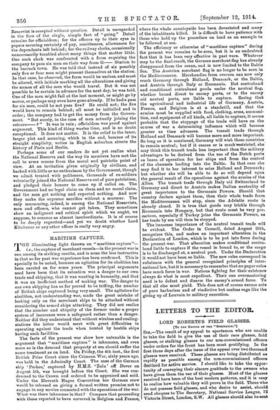MARITIME CAPTURE.
THE illuminating light thrown on " maritime capture"— is., the capture of merchant vessels—in the present war is one among its striking results, and is none the less instructive in that so far past war experience has been confirmed. This is specially to be noted, because an agitation for its abolition has been carried on for some years. The principal arguments used have been that its retention was a danger to our own trade and shipping, that it was wanting in humanity, and that it was an inefficient method of making war. The danger to our own shipping has so far proved to he trifling, the number of British ships captured being very small. The agitators for abolition, not understanding war, made the great mistake of looking only on the merchant ships to be attacked without considering the armed ships attacking. They did not realize that the number and ubiquity of the former under a proper system of insurance were a safeguard rather than a danger. Neither did they understand that without wireless and coaling- stations the latter would meet with great difficulties in operating against the trade when hunted by hostile ships having such facilities.
The facts of the present war show how untenable is the argument that " maritime capture" is inhumane, and even more so is the demand that property at sea should suffer the same treatment as on land. On Friday, the 4th inst., the first British Prize Court since the Crimean War, sixty years ago, was held in the Admiralty Court. The case of the German ship ' Perkeo,' captured by H.M.S. ' Zulu' off Dover on August 5th, was brought before the Court. She was con- demned to the Crown and ordered to be appraised and sold. Under the Eleventh Hague Convention her German crew would be released on giving a formal written promise not to engage in any service connected with the operations of the war. What was there inhumane in that ? Compare that proceeding with those reported to have occurred in Belgium and France, where the whole countryside has been devastated and many of the inhabitants killed. It is difficult to have patience with those who hold up the procedure on land as an example to be followed at sea.
The efficiency or otherwise of "maritime capture" during the present war remains to be seen, but it is an undoubted fact that it has been very effective in past wars. Whatever may be the final result, the German merchant flag has already disappeared from the ocean, and is now limited to the Baltic Sea. The Austrian merchant flag is no longer to be seen in the Mediterranean. Merchandise from oversea can now only reach Germany through Holland, Denmark, or the Baltic, and Austria through Italy or Roumania. But contraband and conditional contraband goods under the neutral flag, whether bound direct to enemy ports, or to the enemy via neutral ports, are liable to capture. Seeing that the agricultural and industrial life of Germany, Austria, France, and Belgium is at a standstill, and that the armies must be supplied with food, clothing, arms, ammuni- tion, and equipment of all kinds, all liable to capture, it seems probable that the stoppage of the trade will have on the ccurse of war a determining influence which will become greater as time advances. The transit trade through Holland and Denmark will become more and more important. So long as it is continued, Germany will wish those countries to remain neutral; but if it ceases or is much restricted, she may think this transit trade less important than the military advantages to be derived from the use of the Dutch ports as bases of operation for her ships and from the control of the channels leading into the Baltic. In that case she may find it to her interest to seize Holland and Denmark; but whether she will be able to do so will depend upon the general result of the operations against the armies of the Allies. The transit trade through Italy rid Switzerland to Germany and direct to Austria makes Italian neutrality of great importance to the Germanic Powers. Should that country declare against them, then their whole trade from the Mediterranean will stop, since the Adriatic route is already closed. It is true that goods may trickle through Roumania into Hungary, but that route must be very pre- carious, especially if Turkey joins the Germanic Powers, as her trade by sea will then be stopped.
The immense importance of the neutral transit trade will be evident. The Order in Council, dated August 20th, recognizes this, and makes an important alteration in the Declaration of London, which is to be put into force during the present war. That alteration makes conditional contra- band liable to capture if the vessel is bound to, or the cargo is to be discharged at, a neutral port. Under the Declaration it would not have been so liable. The new rules correspond in substance with the general recognized principles of inter.. national law, but it is necessary to remember that no paper rules have much force in war. Nations fighting for their existence always do what is most expedient. Their one overmastering need is to defeat and disarm the enemy's armed force. To that all else must yield. This does not of course excuse acts of pure barbarism and of vindictive but useless rage like the giving up of Louvain to military execution.


































 Previous page
Previous page